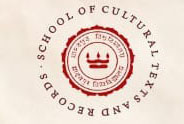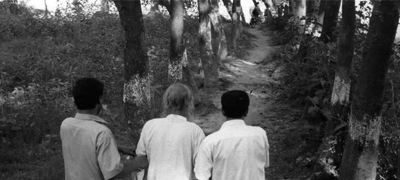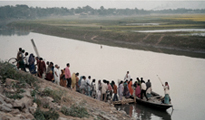We dedicate this page to those who have shown us the way, and still do. Some of you walk with us, some have walked before. Your wisdom shines like light, when we are groping in the dark.
We mourn the passing of Shibda, Shibaditya Sen, our teacher in Santiniketan. Sukanta and I knew him separately as highschoolers, in different decades. Sukanta, more through growing up in and around Santiniketan; me, as Shibda’s direct student. However, it is our work together as/for The Travelling Archive, especially our work on Arnold Bake, which took us to him again.
more
When the 25-year-old Ranen Roychowdhury came to Calcutta from Sylhet, he carried in the vessel of his body, songs from a home he had to leave behind. But this was not just generic communal music that he brought with him, this was also a music processed inside the artist, something of his own… more
Tareque had opened for me the possibility of having a new country; a country of the mind. What connected me to him was the fact that both of us were engaged in a kind of cartography, mapping our fragmented land of Bengal with songs and stories, crossing boundaries, making mental journeys to distant geographies, playing with a complex of times. more
Deben Bhattacharya (1921-2001) was essentially a traveller into worlds of music. He was born in Varanasi, into a family of Sanskrit scholars and practitioners of traditional medicine, that had earlier migrated to this north Indian centre of learning from Faridpur in Bangladesh. A man who could not conform to formal education, Deben Bhattacharya went in his twenties to London, prompted by a deep urge to travel. From then began an enchanting life as music recordist, records producer, filmmaker, writer and translator, who worked in more than 30 countries around the world, but had made Paris and Kolkata his two homes. It was not at all common for someone from the subcontinent to embark on such a career in the 1950s; even later.more
On a Wednesday evening at the end of August 2014, Tinkori Chakraborty, the magical dubki player of Nadia, wandered out of an ashram near Krishnanagar not too far from his home in Nabadwip, where he had gone to visit, and since then he remained untraceable for about three days till his body was seen floating in the waters of a small and dead pond. The official post-mortem report will probably tell when the man had died and how. He was intoxicated perhaps and could not hold himself and maybe that’s why he fell into the waters from where he could not rise. Where he was walking, going from where to where and why, only he would know. Perhaps such details are of no consequence.more
Salamot Khan, who was Salamotbhai to us and was our friend and teacher, lived and died a ‘local man’ in Faridpur, in western Bangladesh in August 2015. Since his death, Faridpur, the place which gave to us some of the best of our songs–Ibrahim Boyati and Habib, Laila and Nuru Pagla, Jainuddin’s jari and Sadek Ali’s bichchhed, Gosai Das’ kirtan, Ajmal’s Lalon, the broken voice of Idris Majhi and so much more—that place seems to have ‘died’ for us. Strange it is; so many of our richest sounds came out of that one place, and yet with one man gone, it becomes clear to us that he was the river through whose body all that music flowed. What happens when such a river stops flowing? more
Notice Board
 Moushumi will present at a workshop on THE ARCHIVE AS A KNOWLEDGE SITE: THE EXPERIENCE OF EUROPE AND INDIA, Organised by SCTR, JU in association with CNRS, France and IRN-AITIA.
Moushumi will present at a workshop on THE ARCHIVE AS A KNOWLEDGE SITE: THE EXPERIENCE OF EUROPE AND INDIA, Organised by SCTR, JU in association with CNRS, France and IRN-AITIA.


 Moushumi spent five days with students and teachers of the Tata Institute of Fundamental Research in Mumbai and also spoke at the Homi Bhabha Centre for Science Education. Her main talk was on The Travelling Archive
Moushumi spent five days with students and teachers of the Tata Institute of Fundamental Research in Mumbai and also spoke at the Homi Bhabha Centre for Science Education. Her main talk was on The Travelling Archive







